Managing Wildlife Populations
Bighorn Sheep Mycoplasma Ovipneumoniae Testing: Results of disease testing from bighorn sheep captures in the Yakima and Cleman herd earlier this year found no confirmed cases of Mycoplasma Ovipneumoniae (MOVI) in tested individuals.
Herd Surveys: District 8 staff began conducting aerial population surveys of the Cleman Mountain and Quilomene Bighorn Sheep populations and the Yakima elk herd. Populations are surveyed from a helicopter and district staff members count and classify observed animals. For elk, group sizes can vary from one to over a thousand animals. When large group sizes are found, an aerial photograph is taken, and counts are conducted from image files using digital processing tools.
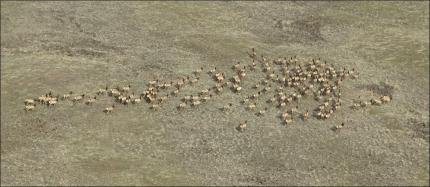
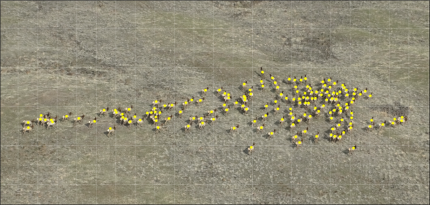
Bat Box Installation: District 8 wildlife staff members met with county representatives to determine locations of bat box installations designed to host maternity roosts in a newly planned flood plain restoration area along the Yakima River in Ellensburg.
Sunnyside Agricultural Field Monitoring: Waterfowl Specialist Wilson and Biologist Bernatowicz took down monitoring cameras and walked the agricultural fields in the Snipes Reserve looking for signs of waterfowl use outside the view of the cameras. Few pictures of waterfowl were seen during monitoring and no sign of significant use was found on the ground.
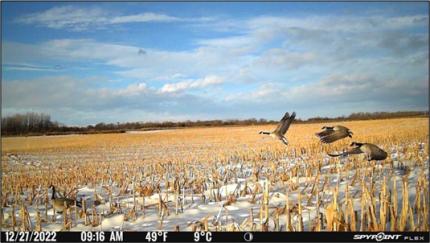
Pre-season Bluebird Box Checks: District 4 Wildlife Biologist Fidorra worked with volunteers to check bluebird nest boxes installed last year. Two nests were found from last season, one with shell fragments. The species identify of the nest hasn’t been determined yet, but it was not bluebirds and may be house sparrow.
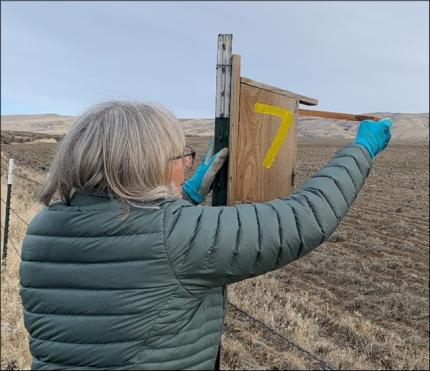
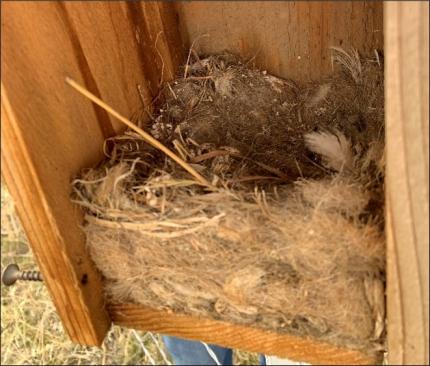
Burrowing Owl Artificial Burrow Maintenance Begins: District 4 Wildlife Biologist Fidorra coordinated a few volunteers and began maintaining artificial burrows prior to the breeding season. Several burrows had vegetation from wintering skunks or needed part replacements. Two burrowing owls were seen at the six sites visited this period and likely overwintered.
Winter Audubon Climate Watch Survey: District 4 Wildlife Biologist Fidorra spent a morning conducting point counts as part of a long-term Audubon Partner’s project related to climate change monitoring.
Elk Feeding: Elk numbers are back up after a brief respite following some warm weather and snow melt. The access road into the Robinson feed site has been pure ice for the last two weeks, making it necessary to continue feeding on the lower road. This makes accurate counting nearly impossible, but numbers are back up this week there as well.
| Date | Site | Cow/Calf | Branched Bull | Spike Bull | Mortality | Total |
|---|---|---|---|---|---|---|
| Feb. 13, 2023 | Watt | 767 | 11 | 14 | 0 | 792 |
| Feb. 13, 2023 | Robinson | 425 est. | 15 | 4 |
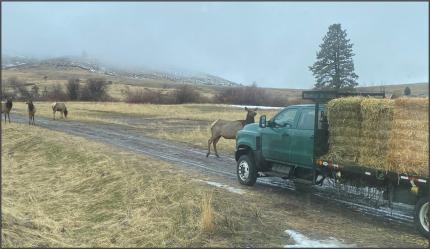
Wet Moldy Hay Fire Hazard: Several smoldering bales were discovered in one of the haystacks due to a hole in the tarp and continued water seepage. The combination of wet moldy hay and tarps trapping heat nearly caused instantaneous combustion. The bales were removed, opened, and spread out away from the barn and haystacks. Re-tarping leftover hay every year may help prevent this happening in the future.
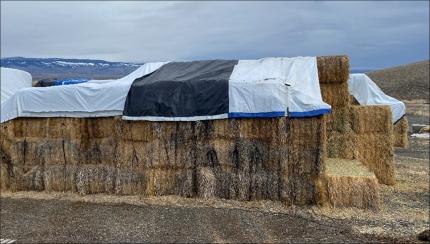
Sunnyside Unit Maintenance: Assistant Manager Ferguson and Natural Resource Technician Wascisin have taken advantage of the warmer weather recently to do some maintenance on the Sunnyside Unit including clearing cattails from the intake of the Giffin Lake pump and resurfacing the entrance road to the office and road to the Rice Paddies Wetlands.
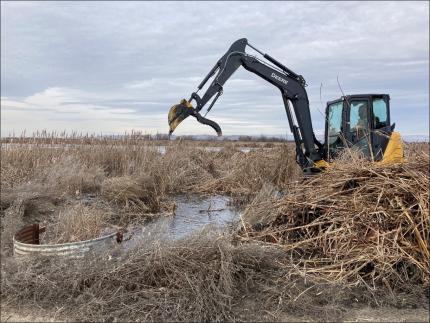
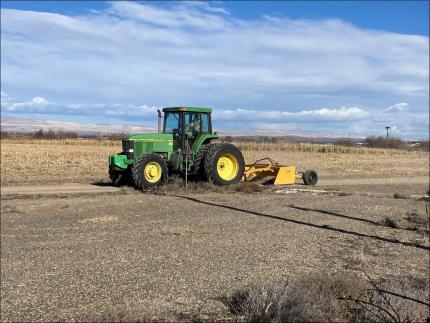
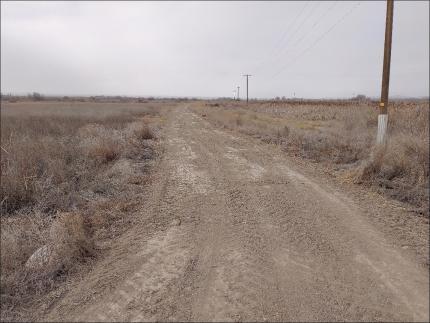
Providing Recreation Opportunities
Manastash Ridge Trails Plan Implementation: Recreation Specialist Frame designed new signage for the Manastash Ridge Trails area. These signs will help inform users of wildlife area rules and regulations and provide trail etiquette and trail safety tips. Other signage will include a trails conditions sign, interpretive wildlife sign, and trail descriptions. Plans to post the new signage will begin in the spring of 2023. Members of the Manastash Ridge Trails Committee were heavily involved in the message displayed on the signs.
Wenas Target Shooting Clean Up: Recreation Specialist Frame removed three pickup loads of trash from multiple spots within the wildlife area, including Sheep Company designated target shooting area, Sheep Company road, and Roza road. These areas have seen an increase in trash burning and trash dumping. Habitat Specialist Miller also assisted in the cleanup.
Providing Conflict Prevention and Education
Ice Harbor Deer: District 4 Wildlife Conflict Specialist Hand met with a manager of a large orchard, vineyard, and blueberry farm near the Snake River that is currently experiencing deer damage to several new plantings of trees. Non-lethal hazing had been implemented with diminishing results. A Damage Prevention Cooperative Agreement and associated damage permits were developed as well as deployment of youth hunters off the Region 3 special hunt permit roster to assist in their hazing efforts.
Paterson Area Deer: Wildlife Conflict Specialist Hand patrolled areas of south Benton County near the Columbia River that have historically received deer damage to mostly wine grape operations and orchards. Although some deer activity was observed, damage was very minor at this time. As warmer temperatures develop and plants come out of dormancy, deer activity and damage will become more prevalent.
Rattlesnake Hills Elk: Wildlife Conflict Specialist Hand continued to monitor for elk activity on the Hanford National Monument and adjoining private lands. Large numbers of elk continue to occupy low elevation areas near Highway 240 on the Hanford Monument.
Youth Damage Hunt Opportunities: Conflict Specialist Hand deployed youth from the Region 3 special permit roster to three landowners experiencing deer damage in their orchards and wheat crops in Game Management Unit (GMU) 381.
New Damage Permit System: Wildlife Conflict Specialist Hand began testing the new damage permit issuance and harvest reporting system being developed by WDFW Information Technology personnel. Several hurdles in accessing the system as well as navigation through the permit development process were experienced. Problem issues were documented, and testing of the system is continuing.
Hanford Elk Crop Damage Report: Wildlife Conflict Specialist Hand completed the required field report on a 2022 crop damage claim report from elk on winter wheat in the Rattlesnake Hills area.
Kahlotus Deer: Wildlife Conflict Specialist Hand continues to work with landowners in the Kahlotus area to minimize deer damage impacts to wheat crops in GMU 381. ATVs are being used to access difficult areas of crop fields to conduct hazing efforts. Large numbers of deer continue to be observed and moved out of crop areas.
Finley Sick Skunks: Wildlife Conflict Specialist Hand responded to a call concerning skunks in Finley that were acting strange. The caller reported that the skunks were walking in circles and had lunged at humans. Four skunks were killed and removed by the landowner, and one was collected for disease sampling.
Conserving Natural Landscapes
Restoration Work: Assistant Manager Winegeart used an over the shoulder hand crank to seed two temporary water trough sites in the Vantage pasture. The area will be harrowed and monitored for weeds. Natural Resource Technician Blore checked the condition of Cayuse restoration area.
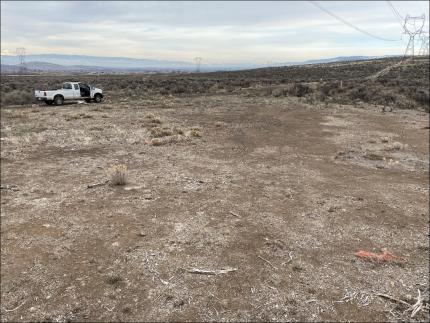
Vantage Rocky Mountain Elk Foundation Grant Proposal: Assistant Manager Winegeart completed and submitted a Rocky Mountain Elk Foundation wildfire grant proposal for the Vantage Highway Fire area. If funded, the grant will allow for aerial weed control across 1,000 acres, and aerial seeding on 200 of those acres.
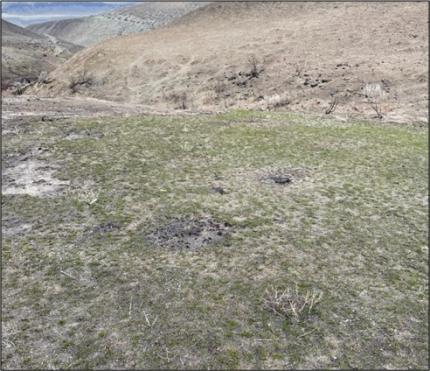
Whiskey Jim Pasture Fence Repair: Natural Resource Workers Hamlin and Schneider repaired pasture and exclosure fence in Whiskey Jim pasture. New barbed wire was added to a previously non-functioning section of fence between Whiskey Jim pasture and Upper Parke pasture.
Habitat Plantings on Private Lands Hunting Opportunities: Region 3 Private Lands Biologist Hulett, Private Lands Technician Manderbach, and Pheasant Forever Farm Bill Biologist Hennings installed 400 sagebrush and bitterbrush plants on two properties enrolled in the Private Land Access Program. Each shrub planting was also flagged for the upcoming herbicide treatments.
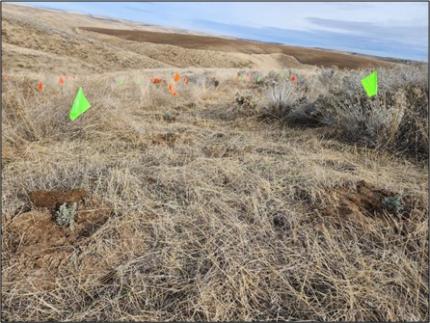
Habitat Planting at Thorton Unit: Sunnyside-Snake River Wildlife Area staff members borrowed a ten foot no-till Great Plains drill seeder from the South Yakima Conservation District for a wildlife food plot project in the Thornton Unit. The site was mowed, harrowed, and sprayed prior to seeding. The food plot mix containing don falcata alfalfa, delar small burnet, yellow sweet clover, appar blue flax, and Eagle western yarrow will provide forage for native wildlife populations including elk, mule deer, various upland birds, and pollinator species. The food plot is located within a Conservation Reserve Program section of the unit and will enhance forage availability for wildlife throughout the year. The seeder was a very efficient tool for this project. Private Lands Biologist Seth Hulett was very helpful with his instruction on calibrating and operating the seeder.
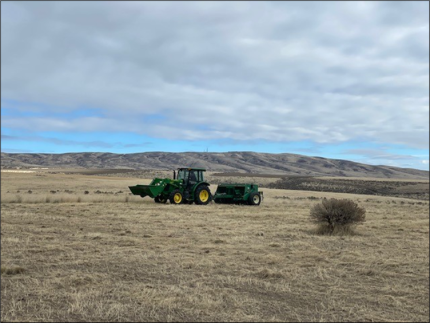
Bryon Unit Trash Removal: Assistant Manager Ferguson and Natural Resource Technician Wascisin removed a pile of several mattresses and couches that were dumped at the Byron Unit earlier this winter. The excavator worked out to be a great trash compactor for the items.
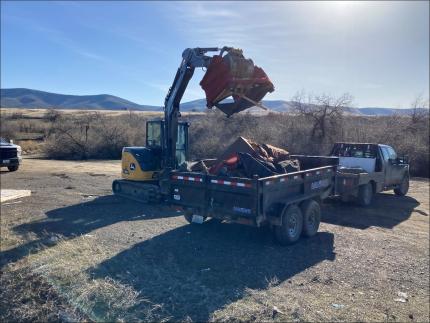
Providing Education and Outreach
Ferruginous Hawk Outreach Presentation: District 4 Wildlife Biologist Fidorra presented to an audience of over 80 people at the Washington Ornithologists Society this month. The presentation covered Department of Ecology and some WDFW science results from movement studies and addressed the surmounting threats and declining population of ferruginous hawks. It was well received and publicly available on the Washington Ornithologists Society’s YouTube channel.
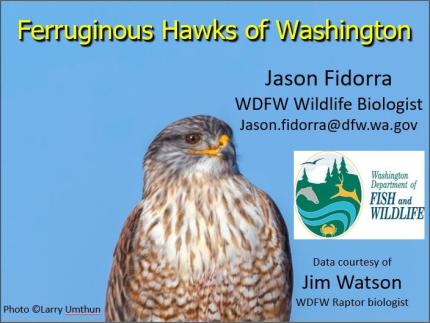
Birds & Blooms Magazine Spotlights the Black-chinned Hummingbird: Wildlife Biologist Fidorra responded to an agency interview request on black-chinned hummingbirds for the nationally distributed magazine. Fidorra provided information on range, identification, and basic ecology of the species for an upcoming article.
Pronghorn Report Draft Complete: Wildlife Biologist Fidorra worked with District 9 staff members to draft the 2023 survey report for the south-central Washington Pronghorn survey. The draft is circulating through Yakama Nation partners before being finalized and published on the WDFW website.
Bateman Island Causeway Recreation Meeting: Region 3 personnel met with concerned members of some of the recreation interest groups at Bateman Island to discuss their concerns related to breaching the causeway and future access to the island. Overall, the groups support the restoration goals of the project but want recreational access to the well-used public space maintained.
Recreation, Facility and Management Panel: Manager Hughes attended an education panel for members of the public developed from the Kittitas County Chamber of Commerce. Guest speakers from WDFW, Washington State Parks and the Bureau of Land Management each presented information about the mission of their agencies, local projects being conducted, and what their job consist of. Hughes did an overview of the Wenas Wildlife Area touching base on future shooting range development, trail management, habitat projects focused on forest thinning, and plans to seed historic agricultural fields back into shrubsteppe habitat in the fall of 2023.
Presenting to Landowners: Region 3 Private Lands Biologist Hulett presented at the Benton County Wheat Growers meeting highlighting the Private Lands Access Program to landowners.
Conducting Business Operations and Policy
Wenas Contract Management: Habitat Specialist Miller has started to review the new Bonneville Power Administration (BPA) contract. This starts the process of ensuring that the proper documentation is submitted to fulfill statements of work outlined in the contract. A large portion of the operating and maintenance budget for the Wenas Wildlife Area is funded by the BPA.